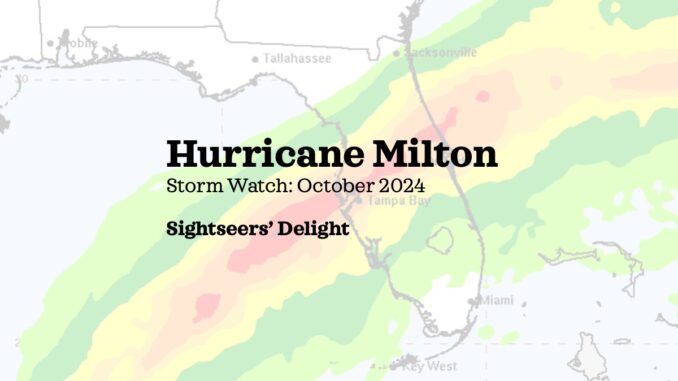
ATLANTA – Gov. Brian Kemp issued a state of emergency Tuesday for 38 Georgia counties likely to be affected by Hurricane Milton, a massive storm expected to make landfall in west-central Florida Wednesday night.
Milton intensified rapidly Monday into a Category 5 hurricane, with winds topping 180 miles an hour. The storm is expected to weaken but only to Category 3 before making landfall, but as it weakens, it is likely to become wider.
In South Georgia and along the coast, the storm is expected to bring heavy rainfall and tropical storm wind gusts. The counties covered by Kemp’s emergency declaration range as far north as Bibb and Monroe counties and include the Columbus and Albany areas in Southwest Georgia, all six coastal counties, the Valdosta area, and Bulloch, Bryan, and Candler counties along Interstate 16.
With evacuation orders in effect in many parts of Florida, traffic volumes on Interstate 75 northbound Tuesday morning were 280% higher than normal from the Georgia-Florida line north to Macon. On I-95 northbound and along I-16, volumes were 89% above normal.
The Georgia Department of Transportation announced that the I-75 South Metro Express Lanes south of Atlanta will remain only to northbound traffic only through Tuesday to accommodate Floridians complying with evacuation orders. The toll lanes can be accessed by motorists using a Georgia Peach Pass, Florida Sun Pass, or E-Z Pass.
The state Department of Natural Resources has opened Georgia state parks to RVs and campers.
Kemp’s emergency declaration for Hurricane Milton co-exists with the state of emergency he declared late last month when Hurricane Helene was bearing down on Georgia. On Tuesday, Kemp renewed the earlier order to run through Oct. 16.
Unlike Helene, which did tremendous damage as it swept through Georgia and the Carolinas, Hurricane Milton is expected to move across Florida on Thursday and into the Atlantic Ocean Thursday night.
— Dave Williams
This article was published by Capitol Beat News Service, a nonprofit news service operated by the Georgia Press Educational Foundation. Content is available free of charge for Georgia newspaper editors and publishers to include in their print and digital products. Click here to view the original.




